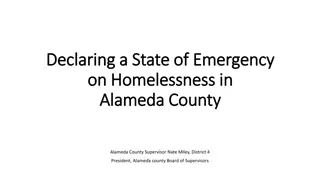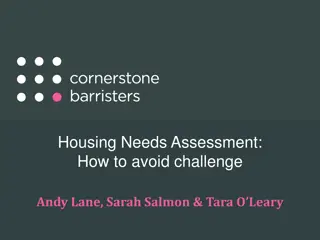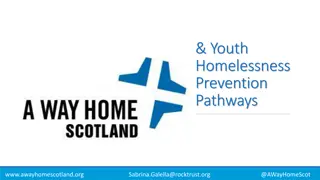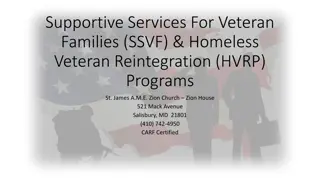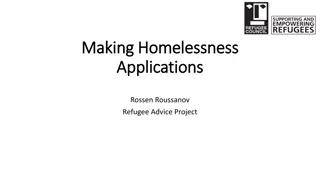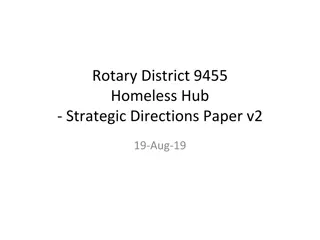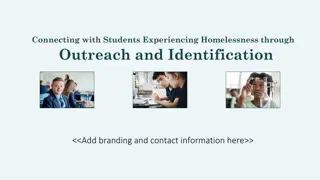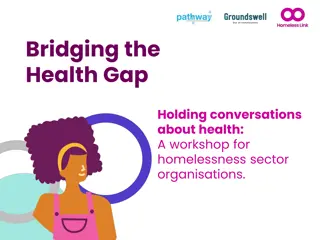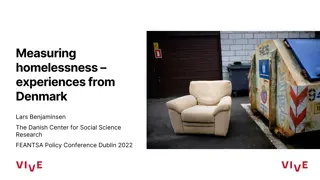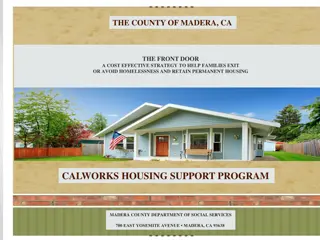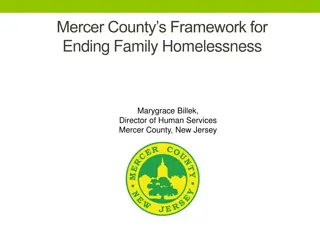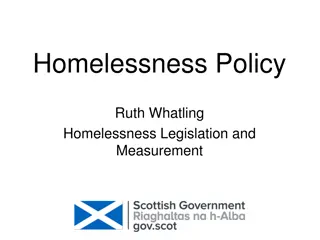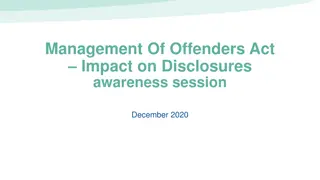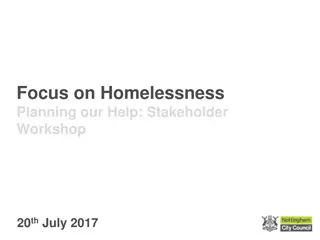Tackling Homelessness: The Impact on Families in Scotland
In Scotland, homelessness is a pressing issue that affects families and children significantly. With households becoming homeless every 18 minutes, over 13,000 children face the harsh reality of not having a stable home. The consequences are far-reaching, impacting physical and mental health, education, and overall well-being. Coupled with housing affordability challenges and poor housing quality, families experience immense hardship. The key to addressing homelessness lies in adopting a holistic approach that focuses on strengths, aspirations, and community support.
Download Presentation

Please find below an Image/Link to download the presentation.
The content on the website is provided AS IS for your information and personal use only. It may not be sold, licensed, or shared on other websites without obtaining consent from the author. Download presentation by click this link. If you encounter any issues during the download, it is possible that the publisher has removed the file from their server.
E N D
Presentation Transcript
Foundations First: Housing as the Bedrock of Family Wellbeing Alison Watson, Deputy Director e:alison_watson@shelter.org.uk t: 0844 515 2452 Twitter: @alisonj_WATSON Until there s a home for everyone
Nature and Extent of Homelessness in Scotland On average, a household in Scotland becomes homeless every 18 minutes 3
Children and Homelessness In 2016/17, there were 13,296 children from 9,517 families assessed as homeless that is the equivalent of 6 children for every school in Scotland. Nearly half of all children who are homeless are under 5 years old. And what is the impact of homelessness on children? And what is the impact of homelessness on children? Homeless children are twice as likely to suffer from poor physical or mental health. Homeless children are twice as likely to be bullied Their mothers are three times more likely to be clinically depressed Homeless children miss out on a quarter of their schooling They are twice as likely to be excluded from school and to leave school with no qualifications. We also know that nearly 6,600 children woke up this morning in temporary accommodation and that figure is at a 10 year high. >1 in 10 households with children spend > than a year in temporary accommodation. 4
Housing Affordability After meeting their housing costs, 19% of Scotland's population, or 1 million people each year, were living in poverty in 2014-17. After housing costs, 24% of children, or 230,000 children each year, were in relative poverty in 2014-17. Before housing costs, one fifth of all children were living in poverty, or 180,000 children. That's an extra 50,000 children in poverty, just because housing costs are unaffordable. High housing costs mean less disposable income to spend on household essentials such as food, gas and electricity to heat your home, or a warm winter coat for your child. Nearly 1 in 5 children live in fuel poverty. 5
Housing Quality 1 in 10 children live in overcrowded homes 186,000 children live in homes affected by damp that is equivalent to all of the children in Glasgow and Edinburgh combined Moving House Moving belongings and financial assistance Dual rent Setting up a home - Community Care Grants: 6
Success Factors in Supporting Families who are Homeless Whole family approach Individual e.g. trauma informed practice Community e.g. community safety; peer influences Structural e.g. housing; benefits Shift from needs and problems to strengths, aspirations and goals 7
Personal Housing Planning Participation, Choice, Control Balancing housing availability and housing aspiration and choice for families Recognises a range of factors in appraising Housing Options Permanent Home Co-produced Personal Housing Plan Engagement with existing services and/or Named Person Shared Ownership Establishes the full support needs of each family member Support assessments are psychologically informed Addresses immediate, medium and longer term Housing aspirations Self-Directed & Personalised Plan Builds on the assets-based approach of our support work to facilitate transition from 'service users' to 'contributors', active in the development & delivery of the service. Empowered by Peer Support 8
A Neighbourhood Approach Families First - Renfrewshire Open access to a one stop service through drop-ins and personalised 121 support Time dedicated to building & fostering relationships Flexibility and going the extra mile Foundations First From service users to contributors Fostering peer support and self-help Joint work to tackle issues in the local estate 9




